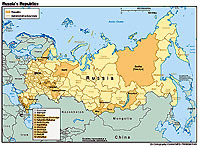Sequel on Vampires Puts Spotlight on Kremlin Opposition

(Moscow Times – themoscowtimes.com – Alexander Bratersky – April 3, 2013)
He never appears for the presentation of his books. His interviews, even short ones, are often literally a sensation and some people even question his very existence.
In modern Russia, Viktor Pelevin is considered a cult figure and many of his books, from “Omon Ra,” a touching and grotesque story about the Soviet space program, to “Generation P,” a novel about a person who turns his very existence into a public relations trick, became national bestsellers.
The author, whose eyes are often covered by dark sunglasses in line with his mysterious image, has released a new book last week, and critics are already predicting that it will be a sensation.
“The new Pelevin is yet another literature blockbuster. It is megalomaniac like ‘Transformers’ and pop-cornish like ‘Pirates of the Caribbean,'” Moskovsky Komsomolets literature critic Nikita Kartsev wrote Friday about the author’s new book, “Batman Apollo,” whose sales started Thursday night nationwide.
The new book can be seen as a sequel of Pelevin’s older novel “Empire V,” a story of an “ordinary” Moscow vampire, Rama. In the new novel, Rama, alongside his American girlfriend Sofi, is fighting “Batman Apollo,” a giant vampire who uses people to literally suck money from them, turning them into heartless machines.
Like in most of his novels, the master of grotesque weaves the country’s political events like anti-Kremlin protests into the narrative. Pelevin even dedicates one of the book’s chapters to the Russian swearing styles, saying that if a politician learns to swear “warm-heartedly” he will be able “to find access to the layers of psyche, closed to other communicators, where the Russian soul lives.” The new novel also features popular political characters of the opposition like Ksenia Sobchak and Alexei Navalny.
Not everyone liked Pelevin’s treatment of opposition characters. Ilya Faibisovich, a prominent opposition-minded journalist, called the novel “boring” in a review for Snob magazine.
“He understands that he is late by a year with his satire, but he still makes it,” said Faibisovich, adding that the protests had become larger and had nothing to do with the “glamorous revolution” of some parts of the elite.
Unlike many of his colleagues who have either sided with President Vladimir Putin or turned against him, Pelevin has kept himself away from political engagements. But in many of his novels, he has heavily criticized both the Russian political elite and oligarchy as well as the opposition.
In one of his latest short stories, “Pineapple Water for the Fair Lady,” he even offers a satirical picture of American supremacy, showing Russian intelligence agent Semyon Levitan speaking to President George W. Bush to influence his decision. In order to convince Bush, Levitan pretends to be God’s voice.
Some Russian critics who know Pelevin have said earlier that he predicted many events, portraying them in his trademark way through telling characters, such as businesslike priests who ride around in expensive racing cars. Some critics have even called Orthodox priest Ilya, who is accused of causing a deadly car accident last year, a “purely Pelevin character.”
“I think that Pelevin is a storywriter of our epoch. He takes various characters to show precisely what is happening, and this is his magical realism,” said Ivan Zasursky, a professor at Moscow State University’s journalism school.
